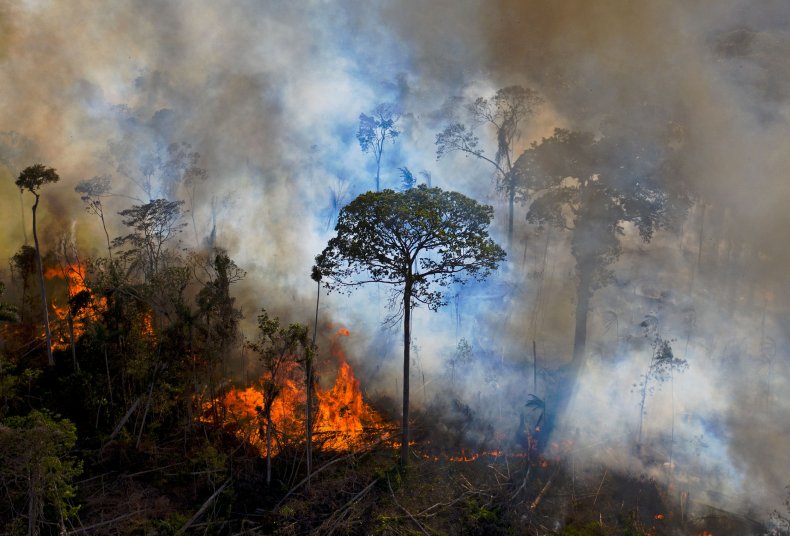The Amazon Rainforest Has Reached the Point of No Return | Opinion
The Amazon, the largest rainforest on Earth—accounting for nearly a third of the world's primary forest—was once one of our greatest carbon sinks. As we recently celebrated World Nature Conservation Day on July 28, we must face the grim consequences of our actions. The Amazon now pumps carbon into the atmosphere.
In a recent study published by Nature, we learn that the rampant destruction of Brazilian rainforests, especially under Jair Bolsonaro's presidency, means the Amazon now emits more carbon than it absorbs. At the end of last year, Brazil's National Institute for Space Research (INPE) reported that Amazonian deforestation hit a 12-year high.
Deforestation is largely driven by beef production, by far the biggest offender in the battle against climate change, with growing demand for burgers and steaks fundamentally transforming the dynamics of deforestation. But prudent action can change our trajectory. The prospect of an EU-Mercosur free trade agreement, for example, could bring about global benefits.
If ratified, the EU-Mercosur free trade agreement would strengthen the relations between the two blocs, making it the EU's largest trade deal in history. That shouldn't be surprising. The European Union is the number one trade and investment partner for the South American trade bloc, which Brazil belongs to—along with Argentina, Paraguay, Uruguay and Venezuela.
Unfortunately, it appears the EU has turned a blind eye to Amazonian deforestation, including President Bolsonaro's empty promises of saving remaining rainforests. In response to this gross dereliction of duty, 450 civil society organizations recently launched a "Stop EU-Mercosur" coalition calling on leaders on both sides of the Atlantic to prevent the agreement from being ratified.
While this is an important and valuable endeavor, there is more we can do and more we should do. Part of that requires thinking outside the box. While it may be impossible to reverse consumer demand for beef (and other commodities), it is possible to seek to produce these goods in ways that do not contribute to deforestation.
There is ample precedent.

A recent study by the nonprofit CDP found that palm oil, of all forest risk commodities, is succeeding in effectively tackling deforestation, especially compared to beef and soy.
That is especially the case in Malaysia, the world's second largest palm oil producer. There, the palm oil industry has introduced a nationally mandated certification scheme, with penalties for non-compliance, known as Malaysian Sustainable Palm Oil (MSPO). MSPO has drastically reduced the country's deforestation rate.
MSPO certification requires producers to meet standards that forbid the conversion of tropical rainforests into palm oil plantations, alongside laws enshrining labor rights and protections—as well as protections for tropical wildlife. Now that about 90 percent of Malaysian palm oil producers are MSPO certified, we can judge for ourselves the effectiveness of this scheme.
The news is hopeful.
A study by the World Resources Institute found a notable decrease in the rate of annual primary forest loss in Malaysia since 2016. Impressively, the findings show that 2020 deforestation levels reached their lowest since 2004. That should be a template for how the EU approaches its free trade agreement with Mercosur. The EU has taken an opposite approach.
The EU decided instead to ban the use of palm oil for biofuels while actively pursuing the Mercosur deal. A boycott of specific commodities rarely brings about the intended outcome. Rather, it risks shifting the demand to countries like China with less stringent environmental standards. Given the EU's stated and often demonstrated concern for the environment, this is a short-sighted move.
Instead, the EU should push beef and soy industries—especially, but not only, in Mercosur—to live up to the kinds of sustainable standards MSPO mandates and achieves for palm oil. That means pushing for transparent and verifiable certification while penalizing producers that refuse to abide by such certification.
With the Amazon rainforest no longer slowing the effects of global warming, but instead contributing to it, we now have an even narrower window in which to act. With the 2021 United Nations Climate Change Conference (COP26) only two months away, the world doesn't have any time to waste if we hope to avert the most severe climate catastrophe in human history.
Our future depends on it.
Isabel Schatzschneider is an environmental activist and researcher specializing in food ethics, religious ethics and animal welfare. She is currently working as a Research Associate at the Friedrich-Alexander University Erlangen-Nüremberg.
The views expressed in this article are the writer's own.


